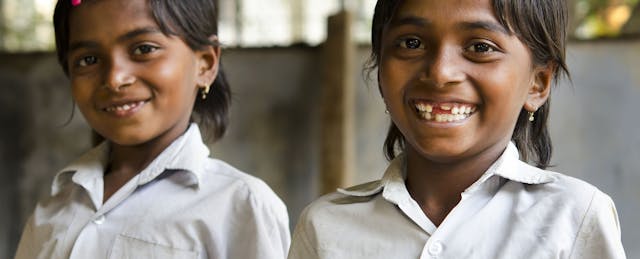A solid early education serves as a cornerstone for a child's future. It shapes their physical, cognitive, social and emotional development while setting them on a path to success in both their academic journey and overall life experiences. However, many young children have limited access to high-quality educational opportunities because of socioeconomic factors and technological barriers. Endless Network, a global organization committed to addressing equity disparities stemming from issues such as inadequate internet access, strategically invests in companies worldwide that align with their mission and actively contribute to its realization. This article highlights the initiatives of one such company, Rocket Learning.
Recently, EdSurge spoke with Rocket Learning cofounders Namya Mahajan and Siddhant Sachdeva about their dedication to bringing high-quality early childhood education (ECE) opportunities to disadvantaged populations in India. Sachdeva’s interest in early education was influenced by his mother, who runs a preschool in her home, allowing him to observe the learning processes of local young children. Sachdeva transitioned from consulting with the Boston Consulting Group to developing solutions for early childhood education. He aspired to make high-quality education financially viable and scalable for a broader system.
Mahajan, who was part of national leadership at the Self-Employed Women's Association, noted that her interest in early childhood education stemmed from the perspective of motherhood, through which she recognized the importance of quality childcare for women's labor force participation and economic empowerment. She became passionate about this subject after delving into research on children's development and realizing the underinvestment and lack of services in this area. Mahajan shares, “Rocket Learning’s mission is to make quality education and learning accessible to every child from the earliest stage possible. Every child deserves equal opportunities regardless of where they come from.”
EdSurge: Are the lack of ECE opportunities unique to a particular demographic, or is this a global problem?
Mahajan: This is absolutely a global problem. There are 350 million children below age six around the world who are at risk of not meeting their developmental potential simply because of where they were born. Due to the way current education systems are structured and how governments, philanthropy and others choose to invest their resources, these children will not get access to the quality early learning they deserve. This sends them to school not ready to learn and has fundamental [negative] effects later in life that are difficult and expensive to reverse. Sometimes, we feel the education ecosystem invests so much in remedial education or learning later in life, where, really, if we fixed the problem early, we could prevent many of these issues. The problem is worse for rural, low socioeconomic communities, but the early years can be underinvested in all households.
India has 35 million children under six who need early learning support. Rocket Learning provides a two-pronged approach. First, we support the community worker who is in one of India’s 1.4 million daycare centers to develop the tools and knowledge to become a skilled early childhood educator. We send them bite-sized pieces of content that they can use in their classroom every day. We take them on this professional development journey over the course of one to two years.
Second, we work with the parents. We recognize that parents have this powerful incentive for children to do well in school, and they can be very effective in teaching children because children learn best when they are with someone they trust and love. We share similar small activities with parents and invite them to share with their communities.
Programmatically, we reach about 1.5 million children, but that’s not enough. The hope is that by partnering with the government, we can bring the latest learning science, the best content and the best technology to every worker and parent who is associated with early childhood development. We have an ambitious goal in the next five years: We hope to have an impact on over 30 million children under age six.
What are the main challenges you have encountered while implementing your programs, and how have you overcome them?
Sachdeva: With any edtech initiative, there are barriers to access and digital literacy. So, we have to consider that when we build out our program. There are also other behavioral barriers we encounter. For example, there might be a caregiver who is not very confident in themselves as an educator and is therefore not engaging as much with the product or mission. Teaching a growth mindset is a fundamental part of how we approach the development for caregivers and teachers. We have also built tools that help us decode and diagnose where caregivers are in their own learning journey from building aspiration to confidence to building the right set of behaviors. There might be parents who have the right aspiration but might not have the right level of confidence in engaging in these programs, and there might be parents who lack the aspiration itself. We have these targeted campaigns that address caregivers wherever they are in the learning process.

How does your organization actively incorporate diverse voices in its work and decision-making processes?
Mahajan: Diversity and inclusion are so important in our work because we want to build an organization that reflects to the [greatest] extent possible the populations we provide for. Many of our leaders are themselves from the communities that we serve. We also try to ensure that we're 50% female, including in leadership positions. We try to preferentially hire candidates from diverse backgrounds, whether that's caste, religion or people with disabilities.
Additionally, we have recently done a major overhaul of the way we create and measure our content. We ensure the content shows children of visibly different communities, backgrounds and capabilities. We show caregivers who are both male and female to encourage fathers and other male caregivers to participate in the household.
What role does technology play in your efforts to provide early learning opportunities, and how do you ensure equitable access to technology resources?
Mahajan: We see technology as a tool, not the sole solution. The solution must consist of high-quality, science-backed early learning content that reaches children every day and helps build their skills and habits. However, it's challenging to achieve this at scale without technology. India's population, including vulnerable households, has a high smartphone penetration rate, with 75% of households having access to smartphones. We design our content to be simple and user-friendly for the smartphone, catering to first-time digital users with a human-centered design. We also consider factors like available memory, data packs, screen orientation and the specific needs of the communities we serve. Our goal is to use technology in the most user-friendly and inclusive way possible, reaching parents with smartphones and children in classrooms.
Sachdeva: We also use technology to run a lot of tests similar to those of large tech companies. These tests are targeted at finding out what works and what doesn’t when it comes to ensuring onboarding, activation and engagement for low-income households and daycare center workers in early childhood education. The idea behind this is we share with the ecosystem what really works and doesn’t work with the low-income communities. There are great organizations out there that are trying similar ambitious goals across the world, and we want them to be able to learn from what Rocket Learning is doing. So, not only is our objective to create open source content for others to use but also an open source model from which others can learn.
What is a memorable story that highlights the impact of your work on early childhood development?
Mahajan: We had this young mom with a 3-year-old who joined our program. The mom actually learned how to use a smartphone just for our program; she was adamant that her daughter learn. Her daughter was one of the quietest children; she was too shy to speak. Her language development was not competent enough to talk to children her age.
Now that the girl is five and has been in the program for a bit, she doesn’t stop speaking! She has learned to count and can start picking out words in a book. She and her parents seek out the homework activity daily, do it together and share it with us. It has been beautiful to be part of this family’s journey for the last two years.
Sachdeva: We also work extensively with the daycare workers. There is a 50-year-old woman who has been doing this caregiver job for the last 25 or more years. She earned a certificate for continued engagement in the program and is much more confident in her day-to-day delivery of early childhood education. Her community is giving her the credit she deserves, and it is fantastic to be a part of her journey. We have been able to not only build improved technical expertise for daycare workers but also make them more confident and proud in their endeavors.



